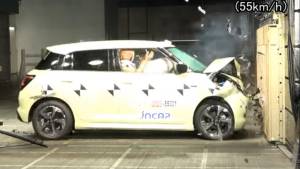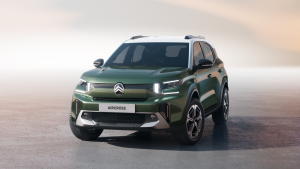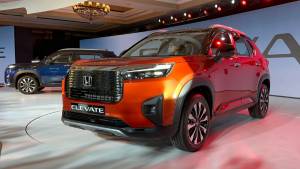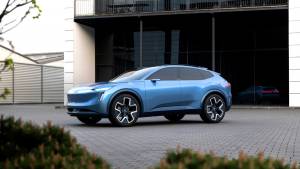Toyota's fuel cell sedan exterior and price revealed
Toyota's fuel cell sedan, previously unveiled as a concept at the 2013 Tokyo Motor Show is now set to be launched. The exterior of the zero-emission vehicle was revealed along with details of its pricing in Japan.
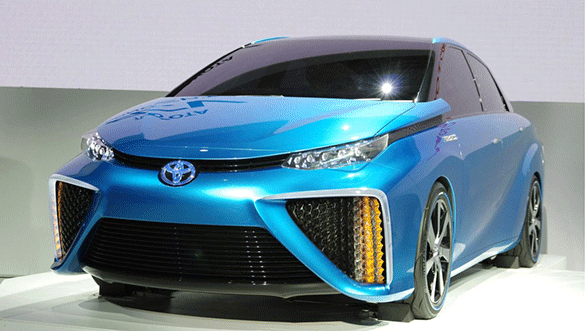
Set to retail at approximately 7 million yen (a little over Rs 41 lakh) in Japan, the sedan will go on sale at Toyota and Toyopet dealerships by April 2015. The hydrogen-fueled car will be later introduced to the US and European markets, depending on the development of refueling infrastructure. The sedan is claimed to deliver performance that can rival a gasoline-powered car at a cruising range of 700km and re-fueling time of three minutes.
With Tesla going the 'open-source' way and Toyota's fuel cell sedan seeing the light of day, it looks like sustainable mobility is not a distant dream after all. Although, as compared to electric powertrains, hydrogen power is hard to harness. Toyota has employed the proton exchange membrane (PEM) technology to achieve this for their fuel cell-powered sales headquarters in Los Angeles. The sedan is said to operate on similar lines. Toyota's previous hydrogen-related initiatives also include the 2002 Toyota FCHV, a fuel cell-powered SUV. They're currently working on applying this technology to forklifts and public transport too.
Toyota's fuel cell sedan exterior and price revealed
| Toyota City, Japan, June 25, 2014 - Toyota Motor Corporation has revealed the exterior design and Japan pricing of its hydrogen fuel cell sedan, first unveiled as a concept at the Tokyo Motor Show last year. The car will launch in Japan before April 2015, and preparations are underway for launches in the U.S. and European markets in the summer of 2015. In Japan, the fuel cell sedan will go on sale at Toyota and Toyopet dealerships, priced at approximately 7 million yen (MSRP; excludes consumption tax). Initially, sales will be limited to regions1 where hydrogen refueling infrastructure is being developed. U.S. and Europe prices have not yet been decided. Likewise, more detailed information, such as specifications, exact prices and sales targets, will be announced later. Toyota's commitment to environment-friendly vehicles is based on three basic principles: embracing diverse energy sources; developing efficient, low-emission vehicles; and driving real and positive environmental change by popularizing these vehicles. Hydrogen is a particularly promising alternative fuel since it can be produced using a wide variety of primary energy sources, including solar and wind power. When compressed, it has a higher energy density than batteries and is easier to store and transport. In addition to its potential as a fuel for home and automotive use, hydrogen could be used in a wide range of applications, including large-scale power generation. Toyota has been developing fuel cell vehicles in-house for more than 20 years. Toyota's fuel cell system includes a proprietary FC Stack, which generates electricity from the chemical reaction between hydrogen and oxygen, and high-pressure hydrogen tanks. In 2002, Toyota began leasing the "Toyota FCHV", a fuel cell SUV, on a limited basis in Japan and the U.S. Significant improvements have been made to the FC system since 2002. The fuel cell sedan Toyota revealed today, for example, features performance similar to a gasoline engine vehicle, with a cruising range2 of approximately 700 km (according to Toyota measurements taken under the Japanese Ministry of Land, Infrastructure, Transport and Tourism's JC08 test cycle) and a refueling time of roughly three minutes. When driven, it emits only the water vapor produced by the reaction between hydrogen and oxygen. Fuel cell vehicles contribute to the diversification of automobile fuels, emit no CO2 or environmentally harmful substances during operation, and offer the convenience of gasoline-powered cars. Toyota believes they have a great deal of potential, and are ideal environment-friendly vehicles for promoting a sustainable mobility society. Toyota Group3 companies are also engaging in other hydrogen-related initiatives, such as developing and testing fuel cells for use in homes, and developing fuel cell forklifts and fuel cell buses. | |
Related Stories
Top Stories
Latest Videos
Most Popular
- Budget Sportbike Showdown: Kawasaki Ninja 500 vs Aprilia RS 457 vs Yamaha YZF-R3
- 2014 Triumph Daytona 675 vs 2024 Kawasaki ZX6R - A Decade of Evolution in Supersport Motorcycles
- Mumbai-Pune Expressway speed restrictions updated
- Nissan Magnite EZ-Shift review - is the AMT any good?
- Nitin Gadkari states that tax on Hybrids should be reduced to 12 percent in the coming future
